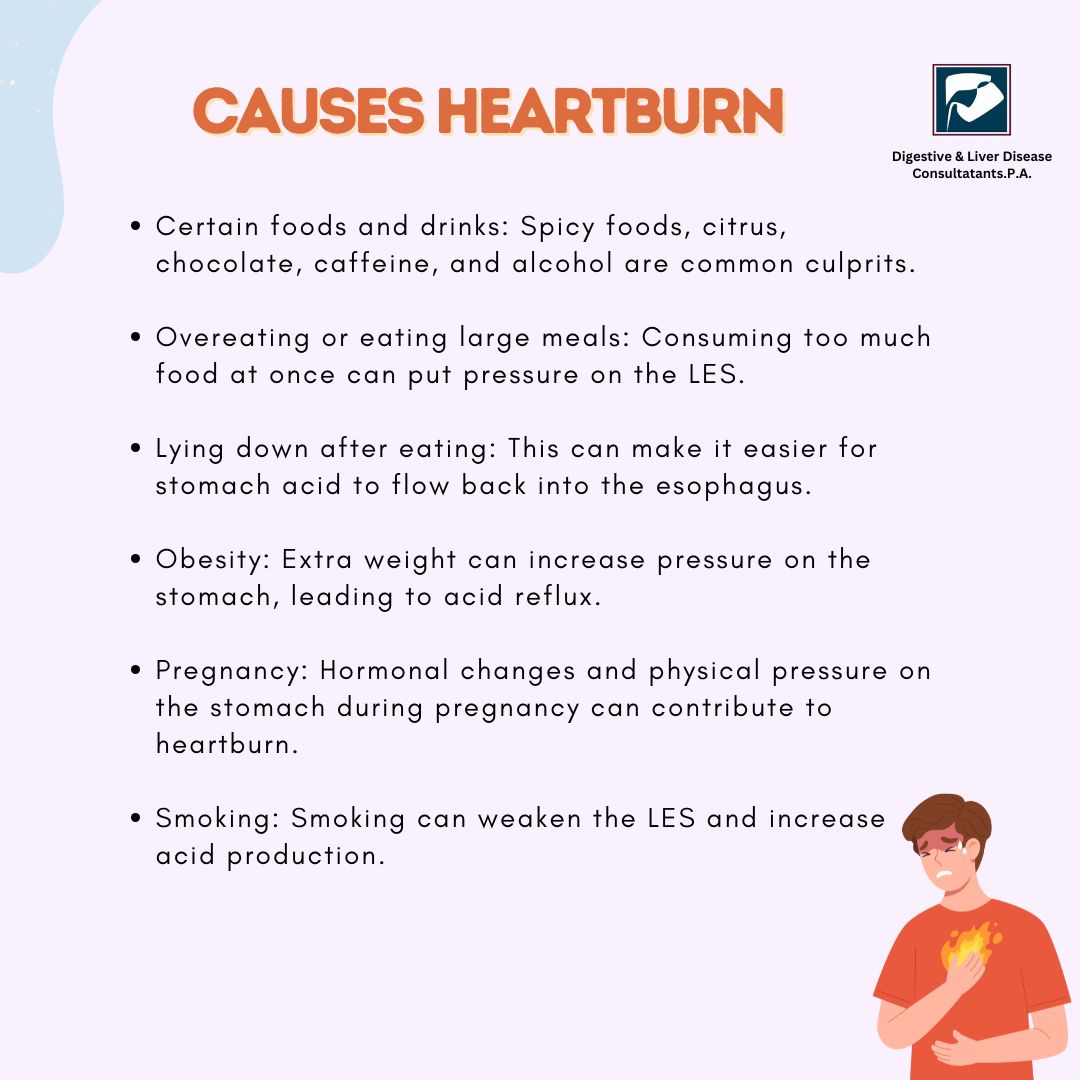Heartburn is a common condition that affects many people, causing discomfort and sometimes pain in the chest. It occurs when stomach acid backs up into the esophagus, leading to a burning sensation. While occasional heartburn is usually harmless, frequent or chronic heartburn may indicate a more serious condition, such as gastroesophageal reflux disease (GERD). Fortunately, managing and preventing heartburn can be done with simple lifestyle changes, dietary adjustments, and medical treatment if necessary.
In this blog, we’ll walk you through effective ways to manage and prevent heartburn, as well as explain how you can benefit from expert care at Digestive & Liver Disease Consultants, P.A.
What Causes Heartburn?
Before diving into prevention and management, it’s important to understand why heartburn happens. When you eat, food travels down your esophagus into your stomach. The stomach produces acid to help break down food, but a muscle at the bottom of the esophagus, called the lower esophageal sphincter (LES), acts as a barrier to keep the acid inside your stomach. When this muscle weakens or relaxes too much, stomach acid can flow back into the esophagus, causing the sensation of heartburn.

Several factors can trigger or worsen heartburn, including:
Certain foods and drinks: Spicy foods, citrus, chocolate, caffeine, and alcohol are common culprits.
Overeating or eating large meals: Consuming too much food at once can put pressure on the LES.
Lying down after eating: This can make it easier for stomach acid to flow back into the esophagus.
Obesity: Extra weight can increase pressure on the stomach, leading to acid reflux.
Pregnancy: Hormonal changes and physical pressure on the stomach during pregnancy can contribute to heartburn.
Smoking: Smoking can weaken the LES and increase acid production.
Tips to Manage and Prevent Heartburn
Fortunately, there are several ways to reduce the frequency and intensity of heartburn. Here are some effective strategies:
1. Eat Smaller, More Frequent Meals
Large meals can cause pressure on the stomach and increase the likelihood of acid reflux. Instead of three large meals, try eating smaller, more frequent meals throughout the day. This can help reduce the amount of acid your stomach produces at any given time, easing the symptoms of heartburn.
2. Avoid Trigger Foods
Certain foods and beverages are known to trigger heartburn. While everyone’s triggers can be different, some of the most common include:
- Spicy foods
- Citrus fruits (oranges, lemons)
- Tomatoes and tomato-based products
- Chocolate
- Caffeine
- Alcohol
- Garlic and onions
- Fatty or fried foods
By keeping a food journal, you can identify and avoid your specific heartburn triggers. Eliminating these from your diet can help significantly reduce episodes.
3. Eat Slowly and Chew Thoroughly
Eating too quickly can lead to overeating and increase the risk of heartburn. Take your time during meals, chew your food thoroughly, and enjoy your meal without rushing. This gives your digestive system more time to process food and reduces the chances of acid reflux.
4. Don’t Lie Down Immediately After Eating
Lying down or reclining after eating can cause stomach acid to flow back into your esophagus. To prevent heartburn, wait at least two to three hours before lying down after a meal. If you must rest, try propping yourself up with pillows to keep your upper body elevated.
5. Maintain a Healthy Weight
Being overweight can put extra pressure on the stomach, leading to heartburn. Losing even a small amount of weight can significantly reduce heartburn symptoms. Along with weight loss, regular exercise can improve digestion and overall health.
6. Wear Loose-Fitting Clothing
Tight clothing, especially around the waist, can increase pressure on the stomach and worsen heartburn. Opt for loose, comfortable clothing to prevent unnecessary pressure on your abdomen.
7. Quit Smoking
Smoking weakens the LES and increases acid production in the stomach, both of which can contribute to heartburn. If you smoke, consider seeking support to quit. Not only will quitting reduce heartburn, but it will also improve your overall health.
8. Consider Over-the-Counter Medications
For occasional heartburn, over-the-counter antacids can help neutralize stomach acid and provide quick relief. Medications like H2 blockers and proton pump inhibitors (PPIs) can also reduce acid production and prevent heartburn episodes.
However, it’s important to use these medications only as directed and not rely on them long-term without consulting a doctor. Prolonged use of some heartburn medications can have side effects, and it’s best to address the root cause of your symptoms.
When to Seek Medical Help
If heartburn occurs frequently (more than twice a week), it may be a sign of gastroesophageal reflux disease (GERD), a more serious condition that requires medical treatment. Other warning signs that require attention include:
- Difficulty swallowing
- Unexplained weight loss
- Persistent nausea or vomiting
- Chest pain (especially if it radiates to the arm, neck, or jaw)
If you experience any of these symptoms, or if over-the-counter treatments aren’t helping, it’s time to schedule an appointment with a healthcare professional.
About Digestive & Liver Disease Consultants, P.A.
At Digestive & Liver Disease Consultants, P.A., our team of experienced gastroenterologists is dedicated to diagnosing and treating a wide range of digestive and liver conditions, including heartburn and GERD. We offer personalized care and cutting-edge treatments to help you manage your symptoms and improve your quality of life. Our specialists are here to provide you with expert advice, tailored treatment plans, and ongoing support as you navigate your digestive health journey.
Conclusion
Managing and preventing heartburn involves making some simple yet effective lifestyle changes. By avoiding trigger foods, eating smaller meals, and making healthy lifestyle choices, you can significantly reduce the frequency of heartburn episodes.
If you suffer from persistent heartburn or other digestive issues, don’t hesitate to reach out to our team at Digestive & Liver Disease Consultants, P.A. We’re here to help you find relief and improve your digestive health.






